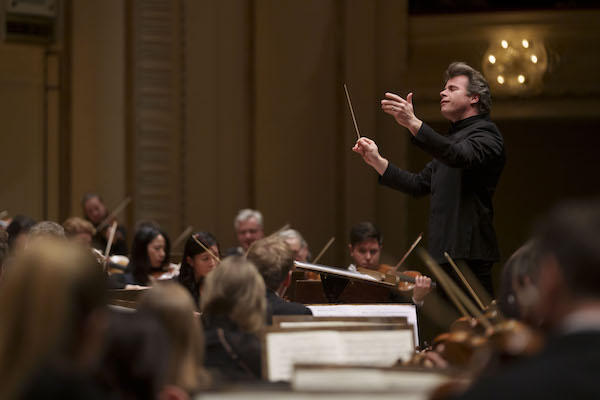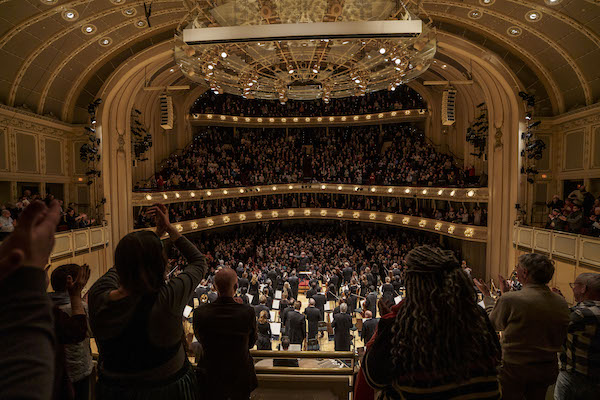Hrůša, Staatskapelle Berlin strike sparks with fresh, exhilarating Brahms

The Staatskapelle Berlin is one of the oldest continuously active orchestras in the world, with origins dating back to 1570 as a court ensemble. The venerable German orchestra splits its time between acting as the pit band of the Berlin Staatsoper and presenting symphony concerts.
In the past century, the Staatskapelle has been led by such luminaries as Richard Strauss, Erich Kleiber, and Herbert von Karajan. On its last U.S. tour in 2017 under Daniel Barenboim, the orchestra achieved a bit of musical history as the first orchestra to perform a complete Bruckner cycle at Carnegie Hall.
Barenboim, the Berlin ensemble’s music director from 1999 to 2023, was to have led the orchestra on its current U.S. tour but bowed out due to illness on short notice.
One must be grateful to Jakub Hrůša for saving the day in Chicago. Having just wrapped up his Lyric Opera run leading performances of Leoš Janáček’s Jenůfa on Sunday, the Czech conductor agreed to take the helm for Tuesday night’s concert at Orchestra Hall.
With minimal rehearsal time, which pushed beyond Tuesday’s house-opening time—and a debuting conductor leading them, one wasn’t expecting a concert for the ages.
Yet despite a few ensemble lapses and errant entrances—likely due to the musicians being unused to Hrůša’s baton style—the Staatskapelle Berlin served up some bracingly fresh and exhilarating Brahms to a large and enthusiastic audience.
In its first Chicago appearance in 19 years, the Staatskapelle showed itself a fine, flexible and virtuosic ensemble. Performing with violins split left and right, the Berlin orchestra presents a lean corporate sonority, lacking some richness in the strings, yet with superb principal players, especially the characterful woodwinds and distinguished brass.
The all-Brahms program led off with the Symphony No. 3. While ostensibly the shorter and lighter of the two symphonies on the program, there was nothing casual or lightweight about Tuesday’s performance.
Rather, this was a Brahms Third of great breadth—generous with repeats—vitality and eloquence. Hrůša judged the tricky tempos of the opening deftly, nicely drawing out the two rising chords that herald the main theme. The movement was bracing and unusually volatile with a strong coursing line throughout.
The pastoral Andante captured that elusive, sweet-sad quality of Brahms’ lyricism, ardent and expressive yet unsentimental, highlighted by the woody-toned clarinets of Tibor Reman and Matthias Glander. Hrůša aired out the opening notes of the Poco allegretto, which featured piquant playing and more wonderful clarinet work.
The finale was fast, surging and dramatic yet remained rooted in the overall canvas. Hrůša judged the concluding slowdown skillfully though, unfortunately, the horns buried the strings’ gentle final reprise of the main theme at the coda.

The Symphony No. 1 followed after intermission. If perhaps less individual than the preceding performance of the Third, this was still outstanding Brahms by any measure. As shown by his CSO stands, Hrůša is a dynamic podium figure and his energetic persona drew committed and propulsive playing in the framing movements. The interior sections of the symphony again proved a highlight with the Andante highlighted by lovely solos from oboist Gregor Witt and concertmaster Wolfram Brandl.
Hrůša was at his finest in the conclusion, building the tension in the gathering storm clouds that open the finale. Karsten Hoffman lofted an understated yet eloquent horn solo and the Beethovenian main theme made sure impact. The conductor charted the ebb and flow superbly while maintaining firm dramatic cut, racheting up the intensity to a fiery, thrilling finale and emphatic final chords.
The Staatskapelle musicians were clearly grateful and impressed by their maestro du jour. Hrůša and concertmaster Brandl embraced and the conductor was warmly applauded by the Berlin musicians.
Despite a long and rousing audience ovation, no encore was offered. But the evening’s excellent and filling Brahms performances made a bonus dessert feel unnecessary.
Posted in Performances



Posted Nov 29, 2023 at 11:26 am by Alan Goldberg
I agree with the above review – a wonderful concert, notwithstanding the occasional lapse, such as the very end of the Third, as described above.
Hrůša continues to impress. He has two weeks of concerts with the CSO in March – I wonder if those will solidify his position near the top of the shortlist for Music Director.
Posted Nov 29, 2023 at 12:06 pm by CA
Very good review, largely agree, didn’t notice the horns burying the strings thing but that may be one of those things that depends on where you’re sitting in the hall.
The things that stood out to me, in contrast to the home team, were the blend, the degree to which the musicians seemed to be listening to each other, and the balance. That trombone sound, yum yum yum, rich and warm. Good description of the string sound; I often think of the CSO’s string sound as dry and academic… and feel that the sound is richer when I hear other orchestras in our hall; this was transparent, vibrant, but not rich. I was proud of the audience for showing some appreciation.
JH is certainly becoming my favorite conductor… still recall that recent Dvorak 6 that was so good I had to attend a second time.
Posted Nov 29, 2023 at 1:20 pm by Brad
Agree with review and previous comment. A glorious concert, and while there were those shaky entrances here and there, the performance was remarkable given the circumstances.
Maestro in his various appearances now with the Chicago Symphony and this orchestra has to be strongly considered to succeed Muti. He seems to be not just a top caliber musician and conductor but a cultured and charismatic figure. There’s an “it” quality he possesses that many do not.
Posted Nov 29, 2023 at 6:09 pm by Donuts 4 All
Given the circumstances, these were probably Barenboim’s Brahms rather than Hrusa’s. Even so, the young maestro impressed last night. He picked the sections of music to rehearse intelligently and above all ensured a captivating start and a glorious ending to the concert. From where I sat in the gallery, the trumpets had a real rough night, but the rest did really well. The strings had a unique luster that is different from other German orchestras. I really want to see what this combination can do if they had ample rehearsal time.
Hrusa is probably high on the list for the MD candidacy, now that Thielemann is no longer available. I would wait to hear what Bychkov has to say.
Posted Nov 29, 2023 at 7:50 pm by Douglas Paige
Beautifully written review, and I agree with your comments. I thought the lower strings (as well as the timpani playing) were outstanding.
A truly beautiful, and exhilarating concert! I thought they had an ideal sonority for this music by Brahms.
Posted Nov 29, 2023 at 8:26 pm by Tim
For many in the audience, the principal horn was the star of the night. If the position for CSO had not already been filled, following Cooper’s departure, he could have easily been offered that job on the spot to the delight of Chicago audiences.
Everyone, also, was talking about this orchestra’s excellent wind section at intermission. It was good to see Hrusa reward them at the end of the concert by walking up to their position to embrace.
Posted Nov 30, 2023 at 5:10 pm by Luke
After sadly missing Hrusa’s performances of Mahler 9 last summer, I’ve been anxiously waiting to see him conduct live and draw my own conclusions about his merit — and, as many have pointed out, he’s fantastic!
I went to this performance for his conducting, rather than the orchestra (though it was largely superb!), and I was pleasantly surprised with how charismatic and engaging he was on the podium… dare I say significantly more than Maestro Muti?
I haven’t been this impressed in a long while, and I certainly hope he is named Chicago’s next MD — I think he would bring a lovely youthful vitality that the orchestra desperately needs.